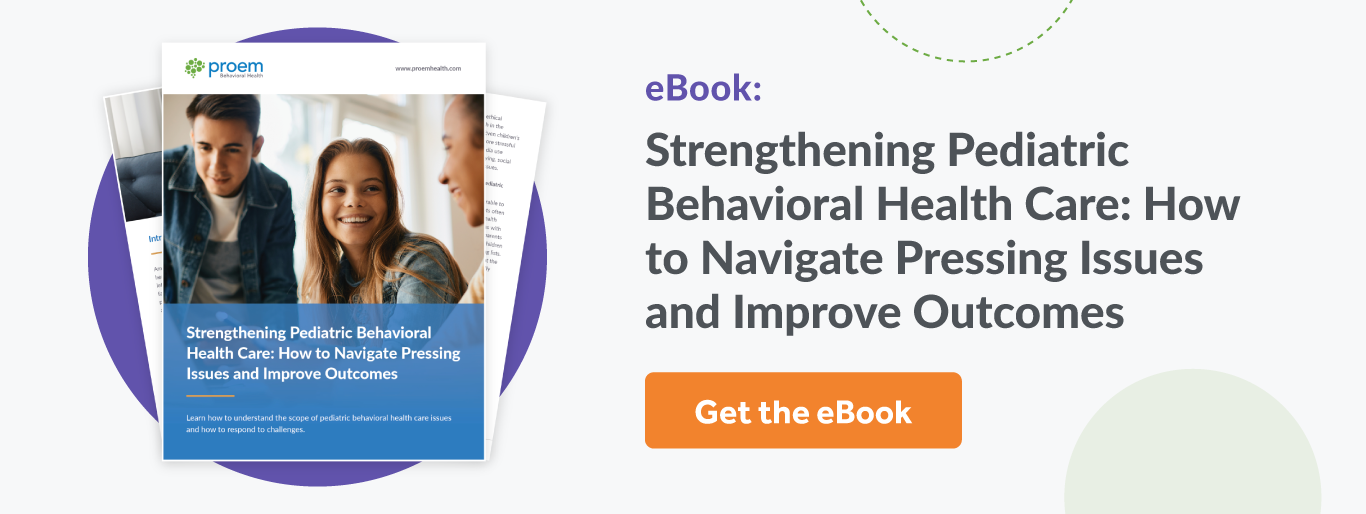There's a children's behavioral health crisis in the United States and globally that existed long before the COVID-19 pandemic. Since the pandemic, this problem has been exacerbated by several factors — from new and mounting health concerns to school closings to an increase in family financial stress. Other issues, such as the rise in school shootings and cyberbullying and the negative effects of social media can further negatively impact the behavioral health of children and adolescents. Behavioral health conditions in children exert a toll on them, their families and society at large.

The peak age of onset for mental disorders is 14.5 years old, and 50% of lifetime mental illnesses take root by the age of 18. Statistics like these illustrate the need to take the pediatric and adolescent mental health crisis more seriously. They also point to the need for pediatricians, who are typically the doctors children interact with most, to play a more significant role in helping to address the mental health crisis for youth.
Why Pediatricians are Poised to Make a Difference in Children's Behavioral Health
Pediatricians have a front-row seat to view some common symptom constellations among their pediatric patients. These include "anxiety, low mood, disruptive behavior and aggression, inattention and impulsivity, substance use, learning difficulty, and social-emotional symptoms in young children," according to the American Academy of Pediatrics (AAP).
In an article published by the Columbia University Irving Medical Center, Assistant Professor of Pediatrics Evelyn Berger-Jenkins suggests that pediatricians are well-positioned to:
- provide education and advice related to children's emotional or behavioral concerns;
- screen for emotional and behavioral problems; and
- screen for social determinants of health like food security and family functioning.
Pediatricians can also play an important role as a trusted source of information in helping families determine what may be normal behavior in their children and what may be a sign of behavioral health issues.
Importantly, as telehealth has increased access to healthcare providers, pediatricians can expand their reach by using videoconferencing and other technology when working with families and children with behavioral health issues.
Pediatricians Can Play a Larger Role in Children's Behavioral Health
Many pediatricians would like to assist further in providing mental health screening and treatment for children and adolescents but feel unprepared or feel like they lack the time and resources to meet the competencies required to improve the mental health care of children. There are gaps in mental health clinical experience and training for pediatricians, pointing to areas in which education can be strengthened.
Pediatricians need to take on an expanded role in addressing mental health problems, but to do so, they need more educational and clinical support. AAP notes in its "Mental Health Competencies for Pediatric Practice" statement that pediatricians will need to develop or hone their mental health knowledge and skills and enhance their mental health practice, with "Enhancements in pediatric mental health practice [depending] on system changes, new methods of financing, access to reliable sources of information about existing evidence and new science, decision support and innovative educational methods."
Children Behavioral Health: Overcoming Barriers to Change
A substantial barrier to better ensuring children and adolescents receive the necessary behavioral health support is the shortage of pediatric mental health providers who can work with pediatricians. This furthers the need for pediatricians to take a more active role in screening children. The U.S. Preventive Services Task Force (USPSTF) recently issued new behavioral health-related recommendations concerning screening children for anxiety and depression, further emphasizing the importance of screening for this population.
Other barriers have emerged as well. As the Centers for Disease Control and Prevention (CDC) notes, "Some families cannot find mental health care because of the lack of providers in their area. Some families may have to travel long distances or be placed on long waiting lists to receive care. High costs, lack of insurance coverage, and the time and effort involved make it harder for parents to get mental health care for their child."
While obstacles exist, there are clear opportunities to seek solutions to the children's behavioral health crisis. Improving training and competence in mental health care for future pediatricians — pediatric subspecialists as well as primary pediatricians — is a national priority of the American Board of Pediatrics.
Taking a combined approach to training is one approach that offers promise. Providing opportunities for mental health providers and pediatricians to train together can help to build important partnerships for delivering care collaboratively.
Pediatricians can also build skills while ensuring a more secure safety net for patients by partnering with local mental health providers. Integrated clinic models bring mental health providers into the primary care setting, which improves access for patients while increasing collaboration between mental health and primary care providers.
Telehealth has become more prevalent for identifying and treating various health concerns and offers benefits, like improved access for providers and patients. As Berger-Jenkins states, "Screening used to be performed in the waiting room, but now families are being processed a lot more quickly, so they don't have to spend a lot of physical time in the office."
Promising Solutions: Child Behavioral Therapy Techniques
Another potential solution is to better ensure pediatricians are prepared to serve as a catalyst to address children's behavioral health issues. Yet this is not their responsibility alone. Taking care of our youth's mental health should be a shared responsibility between the likes of schools, health systems, physicians and mental health providers.
Some examples of how to integrate care across these groups noted by the AAP include:
- Prioritizing training in common-factors communication skills.
- Incorporating mental health competencies into curricular objectives.
- Incorporating the promotion of health social-emotional development into residency curriculums.
The AAP has stated it is "urging pediatricians to pursue integrated and collaborative care models that incorporate psychologists into medical practices and to start including psychologists as training faculty in pediatric residency training programs."
Earlier screening is also essential. Health system administration also can recommend that pediatricians start to screen for emotional and behavioral problems if they don't already do so. This screening can be combined with screening for social determinants of health. AAP has advocated for pediatricians performing mental health screenings on all children and adolescents, evaluating for depression, anxiety and suicide risk in response to the growing mental health crisis among youth.
Pediatricians, like all providers involved in helping overcome the mental health crisis, need the appropriate tools to do complete screenings and achieve early identification of mental illness. Then they need access to appropriate follow-up solutions. Such tools allow those performing screening to know what steps to take following identification of an individual with mental illness. Much of the hesitation around conducting patient screening is a fear of discovering an individual has mental illness and then not knowing what steps they should take next. The right follow-up tools can help reduce or even eliminate fear and hesitation.
Supporting Better Outcomes in Children's Behavioral Health
When it comes to addressing the burgeoning mental health care crisis among children and adolescents in the United States, it truly takes a village. The community of providers, educators, and healthcare providers are coming together to address barriers and take advantage of the solutions available that hold promise for reducing the crisis and helping children get the care and support they need faster.
And pediatricians are responding. There is growing recognition among physicians, according to Contemporary Pediatrics, that, "We can no longer rely solely on pediatric mental health providers to ensure appropriate mental health care for our patients, as the national shortage of these providers continues to grow. In medicine, we have historically separated care of the mind from care of the body, but this separation is no longer sustainable. All of us who work with children and youth must learn how to care for the whole patient — body, mind, and spirit — within the context of their families and communities."
This is good news. We know early identification and screening are important. We understand the barriers to getting children the help they need, and we understand ways to bring about positive changes. Now we need to make those changes a reality.
Proem Behavioral Health is here to support pediatricians and pediatric mental health providers. The Proem behavioral health solution provides the screeners, diagnostic interviews, monitors, scales and measurements that help with more accurate screening and assessment of children starting at the age of 6, thus better enabling early diagnosis and treatment of mental health disorders. To learn more about what Proem can do for you and your organization, request a demo today.





.png)









